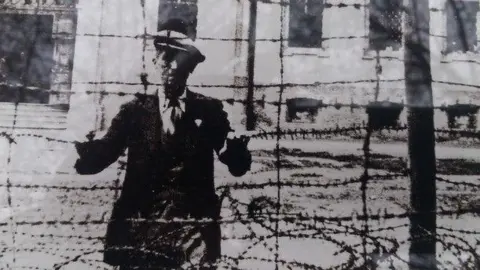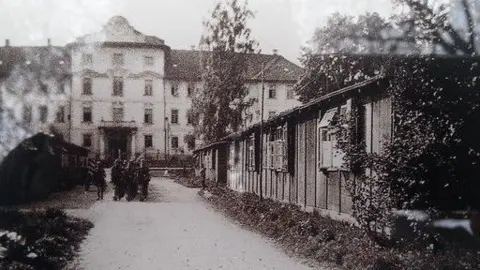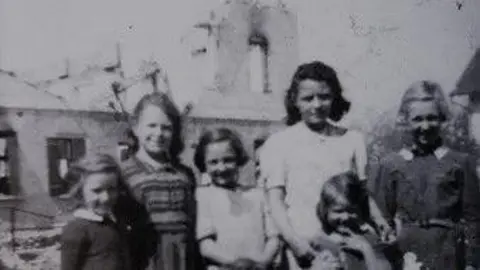What happened in Bad Wurzach in World War Two?
 St Helier – Bad Wurzach Partnership
St Helier – Bad Wurzach PartnershipIt was 1942 and German troops had been occupying the Channel Islands for two years and the lives of those who had stayed in the islands had already been turned upside down.
But for more than 2,000 islanders – life was just about to completely change.
On 15 September those British nationals who were not born in the Channel Islands and were between 16 and 70 years old were deported to Germany with their families.
More than 600 people from Jersey ended up in an internment camp near the town of Bad Wurzach, in southern Germany, and some of those who were held there are travelling back to the camp to mark 80 years since their liberation.
 St Helier – Bad Wurzach Partnership
St Helier – Bad Wurzach PartnershipThe Channel Islanders had been caught up in the wider conflict of World War Two.
In 1941 – Britain and the Soviet Union invaded Iran to protect British-controlled oil fields and Soviet supply lines.
They then deported German nationals who were living in Iran and German Fuhrer Adolf Hitler responded by ordering the non-local Britons in the islands to be taken off the islands and interred.
 St Helier – Bad Wurzach Partnership
St Helier – Bad Wurzach PartnershipChannel Islanders were taken to Camp Lindele - a civilian internment camp near Biberach – where about 1,000 people remained.
Others were then sent to Bad Wurzach where they were interned in the town's 18th Century castle.
Those who were kept there remember staying in dorms "with 30 mothers and children with a stove in the middle and we lived there 24 hours a day".
'Bad memories'
Roy Newton was two years old when he was sent to Bad Wurzach and is making the journey back to the German town.
He said: "I hope the next generation comes and remembers what we went through."
Mr Newton said "I have a few bad memories even though I was very young" but the visit back to the site is important "so I learn more about what my parents went through".
The camp was liberated in April 1945 by French troops.
'Fate in the hands of others'
Jersey historian Ian Ronayne is joining the internees on the journey back to Bad Wurzach and has studied this period of the island's history.
He said many islanders "wrote down their experience" and "they were uncertain as to their fate" while they were imprisoned.
Mr Ronayne said: "The Red Cross were involved in their imprisonment and were able to at least monitor the condition there and support to an extent."
That meant "they weren't treated as common criminals or connected to the concentration camp system" but "they were incarcerated and their fate was in the hands of others".
The St Helier – Bad Wurzach Partnership organises events to ensure the stories of those from Jersey are not forgotten.
The group also works with partners in Germany like the Bad Wurzach Partnerschaft Committee to continue relationships between Jersey and the town.
They work to educate future generations on what life was like for those in the internment camps through projects like art exhibitions which share stories from those who were there.
It also organises regular trips for those who were interned at the camps to return to where they were deported and held to remember and reconcile with those in those towns.
This trip marking the 80th anniversary of the camp's liberation will also involve work to ensure the relationship endures so the memories and stories live on for future generations.
Follow BBC Jersey on X and Facebook. Send your story ideas to [email protected].
